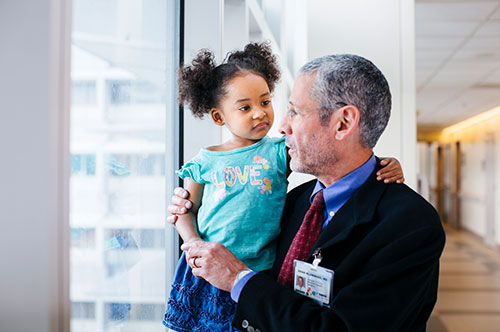Sacramento, CA….With measles outbreaks occurring now throughout the U.S., UC Davis Health experts advise parents to be aware of the symptoms and call a physician if they see any of them in their children. Dean Blumberg, chief of pediatric infectious diseases at UC Davis Children’s Hospital, also answers some frequently asked questions about measles.

Dr. Dean Blumberg, a specialist in pediatric infectious diseases, comforts a child in the hospital.
What are the symptoms of measles?
Blumberg: Measels starts with a fever, which can be very high. Cough, runny nose and red eyes are common. One of the most distinctive features of measles is a red, spotty rash that starts at the head and then spreads downward over the rest of the body. Complications include diarrhea, dehydration, ear infections, pneumonia and inflammation of the brain.
What should I do if I think my child has been exposed?
Blumberg: If you suspect your child may have measles, contact your health care provider and ask if he or she can be seen in an isolation room.
Wasn’t measles eradicated in the U.S.?
Blumberg: Since 2000, measles has been eradicated from indigenous transmission, meaning that we no longer have outbreaks that originate in the U.S.
How is measles making a return to the U.S.?
Blumberg: Measles begins with travelers from other countries where the disease is more common, and then spreads in the U.S. among susceptible children. Children are susceptible when they are too young to be vaccinated, when their parents choose not to vaccinate them or, in rare instances, when the vaccine does not work.
How does measles spread?
Blumberg: Measles is highly contagious. The virus particles are very small and can be suspended in air up to two hours. So, a person with measles who enters and then leaves a room can infect others who enter that same room for up to two hours, without direct person-to-person contact.
How dangerous is measles?
Blumberg: Out of every 1,000 cases, about one to two people die from measles. Before widespread measles vaccinations in the U.S., 500 children died from measles every year. Worldwide, about 90,000 children die from measles every year.
Measles basics
For more information, visit the U.S. Centers for Disease Control and Prevention website.
What is the MMR vaccine?
Blumberg: The MMR vaccine protects children from measles, mumps and rubella (also known as German measles) by exposing them to live, weakened forms of the viruses that cause these diseases. Most do not experience any side effects from the shot. Side effects that do occur are usually very mild and include low-grade fever, transient rash and mild, temporary soreness or swelling where the shot was given.
When should children get their measles vaccinations?
Blumberg: The first dose of the measles vaccination is typically given between 12 and 15 months of age. The second dose is routinely given between 4 and 6 years of age. The first dose protects children 95 to 97 percent of the time. The second dose increases a child’s protection from measles to about 99 percent. By the time children enter school, they should have the two doses.
Does the measles vaccine offer a lifetime immunity?
Blumberg: The majority of adults are immune because they either had measles as children or received the vaccination after it became widely available in 1967. I encourage adults to talk with their health care providers about getting the MMR if they are unsure of their immunity status. There is no danger in getting the vaccine, even if you’ve already had the measles or the vaccine.
If my children are not vaccinated and potentially exposed to measles, should they get the vaccine?
Blumberg: It is a good idea to vaccinate previously unvaccinated children who are potentially exposed to measles. It doesn’t guarantee that they won’t get the disease, however it can lessen the severity if they do.
Does the MMR vaccine cause autism?
Blumberg: There were a lot of concerns about this because of a now discredited publication. Since then, many scientific studies in the U.S. and other countries involving millions of children have reached the same conclusion: The MMR vaccine does not cause autism. Read the UC Davis MIND Institute’s statement on vaccines and autism.


